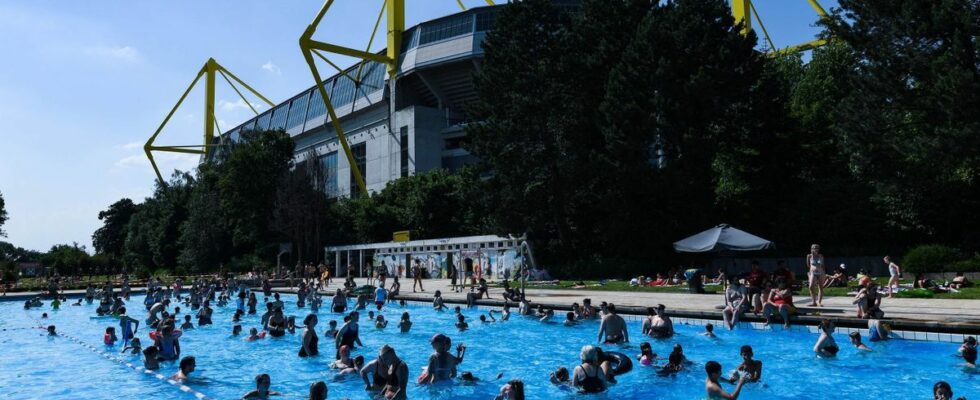Published on
updated on
Reading 3 min.
When she read in the press that Frankfurt’s city council was allowing women to swim without a bikini top, Muriel, 33, rushed to the pool wearing nothing but a monokini.
“Finally,” thought the university project manager, “this right is now recognised in a myriad of German cities.”
“This should have been the case a long time ago, it’s strange that men can swim topless and women can’t” observes this Frankfurt resident.
However, she says she has only seen two other swimmers “topless” this summer in the outdoor pool she frequents. In Berlin, the practice is still very marginal, AFP journalists noted.
“At the moment, I don’t feel ready yet, but I’m working on it!“It’s a real challenge,” Martina Parsch, a 45-year-old physiotherapist, told AFP, sitting on the lawn of a Frankfurt swimming pool.
The change in the regulations, obtained despite the opposition of some municipal elected officials, is supported by Bianca Polcar, who has not yet taken the plunge.
Nudity allows young girls “to love their body as it is“, especially in the age of social networks where “idealized images“, and of “desexualize the breast“, argues this 53-year-old woman.
This authorization is in the order of things for this saleswoman who, when she was younger, used to go to nudist beaches, like many Germans of her generation.
“Aesthetic dictates”
But German-style naturism or “FreiKörperKultur” (FKK – “Free Body Culture”) has weakened. This is evidenced by the halving of the number of members registered with the FKK federation, which has been slightly increasing for the past five years, according to its president Alfred Sigloch.
The idea of seeing bare breasts, “especially from older women,” horrifies Monica, 78, sitting by the water. Even though the pensioner is a big fan of saunas.
A majority of German women, like her, declare themselves opposed to the authorization of topless swimming, according to several polls.
“The female body is linked to projections and fears” explains Anja Zimmermann, professor at the University of Erlangen.
An older or abnormal woman’s breast is “taboo”, and “depicted in texts and images in a repulsive way“, analyzes the professor, author of an essay on the history of the breast.
This part of the body continues to be “sexualized, even fetishized, and remains subject to very strict aesthetic dictates” she adds.
The “topless” movement started in Göttingen (central) in 2022 after a topless person who identified as non-binary was refused access to a swimming pool.
When the city’s municipal swimming pools changed their rules, management said they had to deal with “extreme” camps of monokini supporters and opponents.
“It is a public space that welcomes different interest groups and different mentalities.“, a manager had testified in the press. Burkinis are authorized in most German swimming pools.
“Modesty”
In 2023, Berlin’s swimming pools took the plunge, following a highly publicized complaint by a resident of the capital. She contested the fact that the police had come to ask her to put on a swimsuit top or to leave the public water park where she was sunbathing topless.
After a rejection at first instance – the court citing the right to protect the “sexual modesty” of others – she obtained compensation at the end of 2023.
Since then, dozens of major cities such as Frankfurt and Cologne have clarified their regulations to recognize this right. In Switzerland too, as in Zurich since summer 2023.
In some municipalities, such as Hamburg, toplessness is permitted on specific days of the week.
Although the monokini is far from being normalized, as in the capital, the historic Berlin trial has made it possible to “to raise awareness among people, to show them what was possible“, comments Soraia Da Costa Batista of the Gesellschaft für Freiheitsrechte (GFF), a Berlin NGO which accompanied the complainant.
